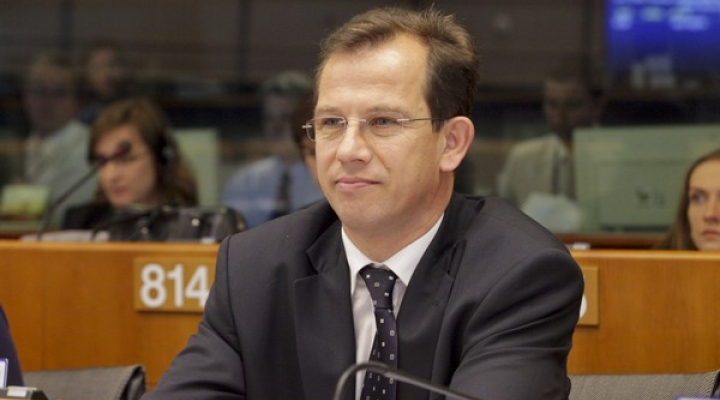Five Hungarian MEPs raised awareness about the situation of the actor from Slovakia whose citizenship has been revoked
Five Hungarian speaking MEPs – Edit Bauer, Kinga Gál, Alajos Mészáros, Csaba Sógor and László Tőkés spoke at the plenary session of the European Parliament in Brussels on the 30th of November about the situation of Olivér Boldoghy, whose citizenship has been revoked by the Slovakian Ministry of Interior after it became known that he received the citizenship of another EU member state, Hungary.
MKP’s Edit Bauer made reference to the fundamental freedoms of EU citizens and reminded about the absurd situation that arose: Boldoghy’s papers have been confiscated, so he has to apply for a residential permit in order to live in his own house.
Her conational, Alajos Mészáros said that the interdiction of dual citizenships infringes several EU policies. Kinga Gál said that the issue is in the European Commission’s and Parliament’s competence and that the revocation of citizenship cannot be used as a sanction for a citizen who has lived all his life in the country and has been paying his taxes. Transylvanian MEP László Tőkés called the situation unacceptable and untenable.
DAHR’s MEP Csaba Sógor sustained that the actions of Slovakian authorities aim to intimidate and urged for solutions based on the needs of the citizens and which offer mutual satisfaction to all parties. Here follows his speech:
“Mr. President! We have already raised our voice to highlight the contradictory nature of the situation when the Slovakian government decided to revoke Slovakian citizenship from those citizens who receive the citizenship of another country. I would like to speak about a particular case. Olivér Boldoghy is a Hungarian national, but has been a Slovakian citizen since birth and has been stripped of his Slovakian citizenship against his will, after he had received the citizenship of neighboring Hungary. Slovakia intends to intimidate its citizens, so that they do not assume their nationality to which they are tied to through language and culture. In most cases, national and state borders do not correspond in modern Europe. We have to do everything in our power so that this situation does not generate tensions between member states. We need solutions that offer satisfaction to all parties based on the citizens’ needs. Slovakia is not walking along this path right now.”
-------------------------------------------------------------------------------------------------------------------
Should Croatia become the 28th member of the EU in these times of crisis? This is the question MEPs debated on the 30th of November and voted for on the 1st of December.
DAHR’s MEP Csaba Sógor spoke for the integration of states from the Western Balkans but only after the problems of the traditional national minorities in the region have been solved. Here follows the MEPs speech:
“The European Union is going through the worst period of its history when cooperation and solidarity has been substituted for lack of trust and introversion. I salute the fact that the Commission and the member states have remained open towards Croatia’s accession in these grave times. The united Europe cannot be complete without the integration of the states of the Western Balkans. But through their accession, the issue of traditional national minorities will have to be addressed at the European level. We need to face this issue. The integration of these states can only be successful if we do not ignore the minority issue. I am convinced that Croatia’s will not stray onto the path of those member states which have been ignoring their promises regarding minority protection after accession.”











